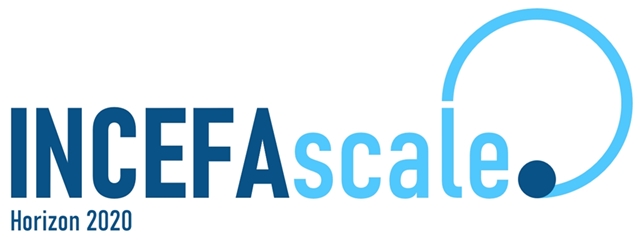The INCEFA-SCALE Project addresses six main organizational, scientific and technical issues, with their corresponding work packages, designed to fill these identified gaps.
Issue 1. Project Management:
The project management includes all the management and coordination activities that are necessary to guarantee an adequate development of the project. This issue is covered in Work Package 1 (WP1).
Issue 2. Data Mining:
The data to be mined will be that created by the predecessor INCEFA-PLUS Project, and that shared with the consortium during INCEFA-PLUS by Preussen-Elektra, Mitsubishi Heavy Industries, USNRC, EPRI and NRA. All of this data resides in the JRC MatDB database, which will be optimized to support the intensive data mining activitieshe definition and execution of a focussed test programme. During INCEFA-PLUS the data used most were the cycles to a percent load drop, type of specimen, material, and loading conditions. Use of other data such as hysteresis curves, and material characterisation was restricted to that necessary to establish data reliability and to seek understanding of outlier results. Data obtained from outside INCEFA-PLUS was used to test empirical observations. The consortium believes that significant mechanistic insight can already be possible by revisiting this data and subjecting it to detailed review. Furthermore, all the specimens tested during INCEFA-SCALE remain available and some of these can be expected to be subjected to detailed destructive characterisation. This issue is covered in Work Package 2 (WP2).
Issue 3. Test Program:
Testing activities will be to confirm testing requirements and agree the distribution of these amongst the consortium. Since many partners already have quite innovative testing capabilities, there can be confidence in the ability to develop capabilities further if required, and within available resources. Specimens will be made a common agreed material and either in a common machine shop, or to agreed machining specifications. The first testing activities are managed by covering standard uniaxial tests, and the second covering non-standard tests. A significant attention will be given to ensuring partners work to an agreed testing protocol. For uniaxial testing a protocol was created during INCEFA-PLUS Project; non-standard testing requirements will be developed from this standard. The use of an Expert Panel, pioneered during INCEFA-PLUS, will continue to ensure high quality and completeness of all data created during INCEFA-SCALE. This issue is covered in Work Package 3 (WP3).
Issue 4. Modelling and Development of Assessment Rules:
Whilst themechanistic understanding developed within WP5 will be interesting from a research perspective, work is required to translate this understanding into workable procedures able to be used by plant assessors. It is likely that these procedures will be defined in terms of additional processes or factors to be employed within existing codes and standards to make the results more appropriate for the range of component geometries and loadings typically present in NPP. The ability to do this derives from the experience within the consortium of development of environmental fatigue lifetime assessments for a variety of European NPPs. This issue is covered in Work Package 4 (WP4).
Issue 5. Mechanistic Understanding:
Developing the required mechanistic understanding of the differencesbetween the behaviour of standard uniaxial laboratory specimens and real NPP components. This work spans the full five year project duration. It begins by developing understanding from already existing data and specimens, and then moves to develop this further using data generated by INCEFA-SCALE. Since material examination is likely to be featured here, organisations with significant experience in material examination focussed on the needs of mechanistic insight leads this tasks. This issue is covered in Work Package 5 (WP5).
Issue 6. Dissemination and Training:
Dissemination and training play a key role in this project, with the aim of obtaining the maximum added value. This issue covers the dissemination of the Fatigue Assessment Procedure developed by WP4, the publication of the experimental results and their corresponding analysis, participation in international scientific events, and the organization of training seminars for experts and for young scientists. This issue is covered in Work Package 6 (WP6).
